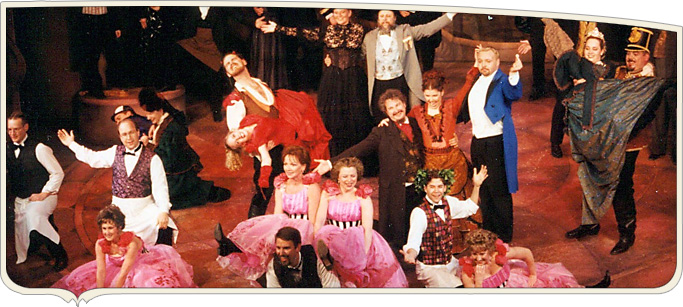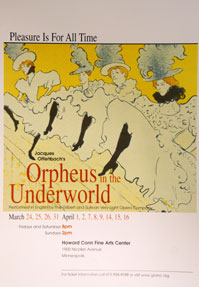
“It displays a lot of stocking,
which is always very shocking!”
The Grand Duke

Orpheus in the Underworld
March 24 to April 16, 2000
Orpheus in the Underworld Program
Directors
| Stage Director: | Lesley Hendrickson |
| Music Director: | Steven Michael Utzig |
| Artistic Director: | Wendy Evans |
Why Do Offenbach’s Orpheus in the Underworld?
Gilbert knew and liked the Offenbach operettas and stated that he hoped to emulate his work, but in a more distinctly British style. Gilbert was particularly adamant that his plots and staging would allow any Englishman to feel comfortable bringing his wife and daughters to see the shows. Offenbach’s libretti, after all, were the very definition of “too French”! Offenbach and his various librettists share Gilbert’s interest in topical satire and character-based humor. And both liked to see pretty girls on stage — though Gilbert’s chorus ladies were costumed rather more discreetly.
The Setting for Offenbach’s Orpheus in the Underworld
This satiric retelling of the Orpheus legend is set in Ancient Greece (or at least an Ancient Greece that seems a lot like France of the second empire). Comparison of the households of the Emperor Napoleon III and the god Jupiter, so unlike the home life of our own dear queen, suggests serious family dysfunction on both parts. In Act I, down on earth, Orpheus is annoyed at his bored wife Eurydice for cheating on him. When she is abducted by Pluto and swept away to the underworld, Orpheus is forced to visit Mount Olympus (Act II) to ask for the gods’ help in getting her back – if only to appease Public Opinion, here a character in her own right. In Act III, everyone ends up in the underworld. Pluto, Jupiter and Orpheus are all competing for Eurydice, but the rest of gods are there for the party!
An Historical Note
Orpheus in the Underworld was first performed in 1858, and reached London in 1865. Its success was one of the inspirations for the creation of a home-grown English operetta, and for Richard D’Oyly Carte’s pairing of Gilbert and Sullivan to accomplish it. Orpheus in the Underworld was revised in 1874 to the full four-act version with chorus, and achieved even greater popularity. The English adaptation we are using was created for the 1985 English National Opera production.
Lesley Hendrickson
An excellent internet resource for information about Orpheus in the Underworld:



















